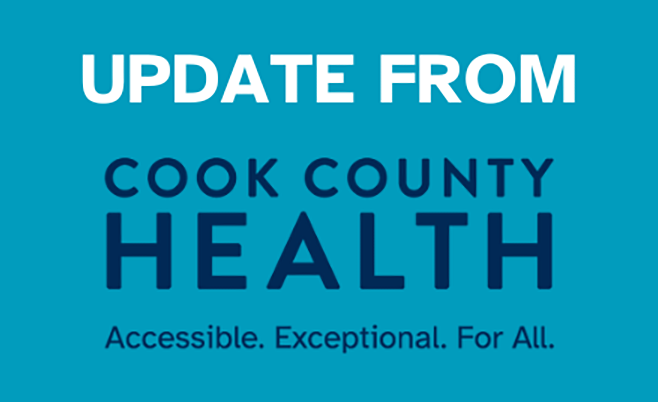The Cook County Health’s (CCH) John H. Stroger, Jr. Hospital has been awarded Advanced Certification as a Primary Stroke Center by The Joint Commission, in recognition of its long-time success in improving outcomes for stroke patients.
The award is based on Stroger Hospital having met the high standards for stroke care determined by The Joint Commission in conjunction with the American Heart Association/American Stroke Association.
Stroger Hospital was evaluated on-site by a Joint Commission surveyor skilled in stroke care, on August 25, 2016. During the detailed, day-long evaluation, the expert reviewed Stroger’s compliance with the requirements for The Joint Commission’s Disease-Specific Care Certification program for Primary Stroke Centers. Requirements include highly-trained stroke specialists available 24/7, modern facilities, and the ability to provide rapid evaluation and treatment of patients with acute stroke. Hospital care and rehabilitative service requirements must also be met to earn the award.
“Hospitals are not required to undergo such rigorous certifications by The Joint Commission. Stroger Hospital has chosen to pursue and maintain Primary Stroke Center accreditation, to ensure we are offering stroke patients the best care possible,” said Dr. Michael Kelly, Chair of Neurology at CCH.
Stroger has been recognized as a Primary Stroke Center since 2014.
In particular, The Joint Commission complimented Stroger Hospital for the exceptional multidisciplinary stroke care it provides.
Stroger has a team of board-certified specialists, who work together to provide expert care for patients who have had a stroke. Specialists include experts in neurology, intensive care, emergency medicine, hospital medicine, and physical, occupational and speech therapy.
Each year, the hospital treats more than 400 stroke patients.
Treating a stroke:
Dr. Kelly stresses that the most important thing you can do if you think you’re having a stroke is to call 9-1-1 immediately, so an ambulance can get you to a stroke center as quickly as possible.
Strokes happen when there is decreased blood flow to the brain, either because of a clot in your blood vessels or a rupture. The longer brain cells go without blood, the more likely they are to die, causing permanent damage that can even be fatal.
Getting to a stroke center quickly after you have a stroke increases the chances that you can be given a clot dissolving drug, called tissue plasminogen activator, or tPA, which can restore blood flow to the brain.
People who received treatment for a stroke at primary stroke centers, like Stroger Hospital, were nearly twice as likely to receive tPA compared to hospitals that were not certified, a study released recently in the journal Neurology reported.
What are the signs and symptoms?
According to the Centers for Disease Control and Prevention, they include:
- Sudden numbness or weakness in the face, arm, or leg, especially on one side of the body
- Sudden trouble speaking, difficulty understanding speech, or confusion.
- Sudden trouble walking, dizziness, loss of balance, or lack of coordination.
- Sudden severe headachewith no known cause.
High blood pressure, high cholesterol, diabetes and smoking can all increase a person’s risk for a stroke. Nearly 80% of strokes could be avoided with healthy lifestyle decisions.
Click here for more information about Stroger Hospital’s stroke program.

